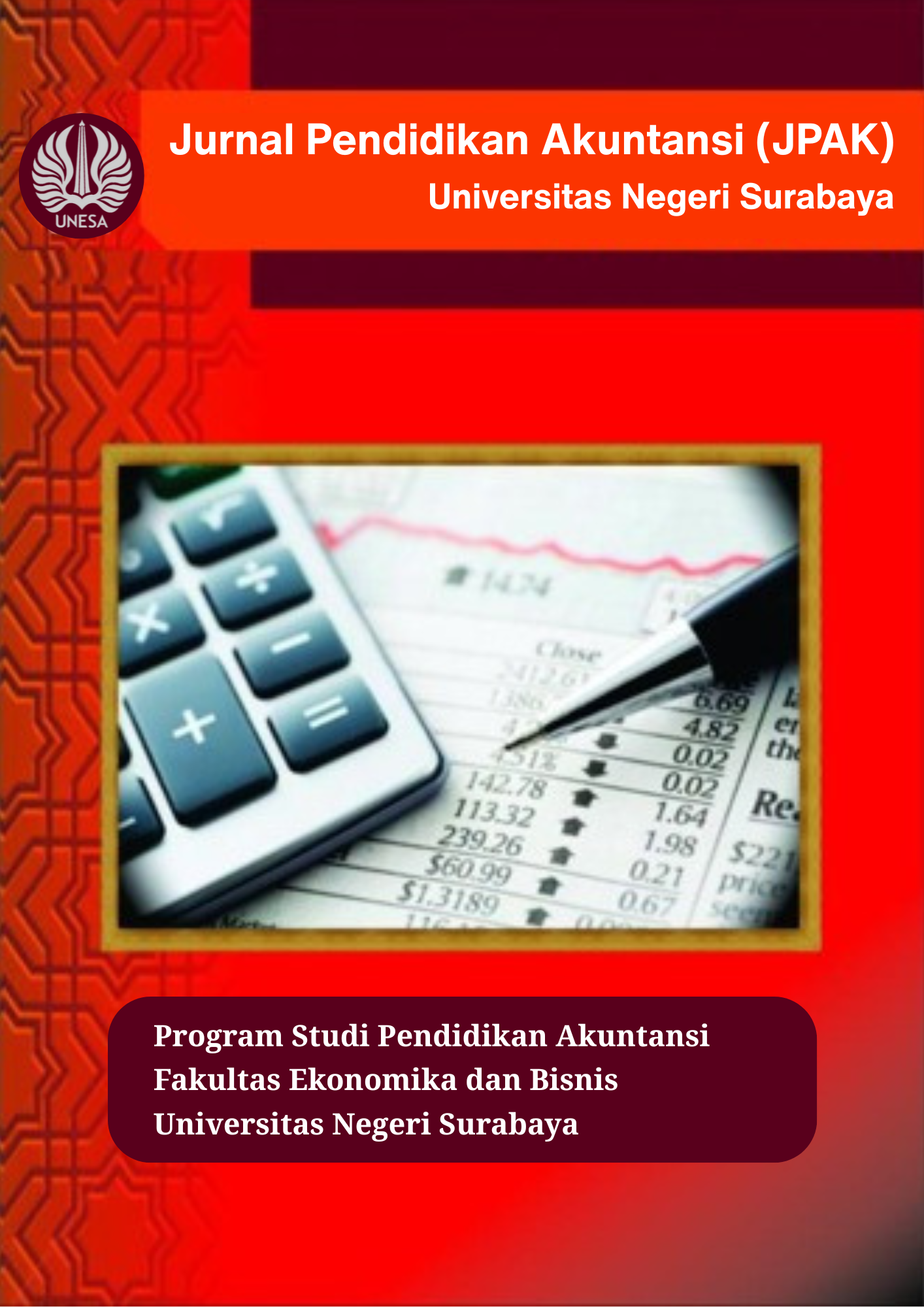Accounting Learning Behavior in Project-Based Classroom: Method, Environment, Behavioral Control
Abstract
This study investigates the factors that influence students' learning behavior in a project-based accounting class. A quantitative approach was employed by distributing questionnaires to students after they participated in group projects in the Accounting Computerization course at the Faculty of Economics and Business, Pattimura University. The study collected data on students’ perceptions of the project-based classes they had undertaken. Multiple regression analysis was conducted using SPSS 28 as the data analysis tool. The results indicate that attitude does not influence accounting learning behavior. Furthermore, project-based learning methods, environment, and behavioral control have a significant influence on the learning behavior of accounting students. Project-based learning methods provide ample space for students to be directly involved in problem-solving, thereby increasing engagement, interaction, and collaboration with group members and instructors, and fostering positive learning behaviors. The strength of this influence is demonstrated by an R-squared value of 68.7%, which indicates that the influence between variables falls into the strong category. The better the learning environment and behavioral control, the more positive the learning behavior.
Downloads
References
Ajzen, I., & Driver, B. L. (1992). Application of the Theory of Planned Behavior to Leisure Choice. Journal of Leisure Research, 24 (3), 207–224.
Ajzen, I., & Madden, T. J. (1986a). Prediction of Goal-Directed Behavior: Attitudes, Intentions, and Perceived Behavioral Control. Journal Of Experimental Social Psychology, 22, 453–474.
Ajzen, I., & Madden, T. J. (1986b). Prediction of Goal-Directed Behavior: Attitudes, Intentions, and Perceived Behavioral Control. In Journal Of Experimental Social Psychology (Vol. 22).
Aljohani, H. S., & Alharbi, K. M. (2025). Investigating the Entrepreneurial and Accounting Factors Influencing Saudi Female Students’ Entrepreneurial Intentions. Sustainability (Switzerland), 17 (8). https://doi.org/10.3390/su17083398
Andargie, A., Amogne, D., & Tefera, E. (2025). Effects of project-based learning on EFL learners’ writing performance. PLoS ONE, 20(1 January). https://doi.org/10.1371/journal.pone.0317518
Anggraini, P. N., & Sulistyowati, S. N. (2022). Pengaruh Pengasuhan Orang tua dan Kemandirian Terhadap Minat Belajar Siswa Akuntansi dan Keuangan Lembaga di Masa Pandemi COVID-19. Jurnal Pendidikan Akuntansi, 10 (3), 2722–7502.
Ariff, A. H. M., Bidin, Z., Sharif, Z., & Ahmad, A. (2010). Predicting Entrepreneurship Intention Among Malay University Accounting Students In Malaysia. UNITAR E-JOURNAL, 6(1).
Beckett, G. H. (2002). Teacher and Student Evaluations of Project-Based Instruction. Tesl Canada Journal, 19 (2).
Blumenfeld, P. C., Soloway, E., Marx, R. W., Krajcik, J. S., Guzdial, M., & Palincsar, A. (1991). Motivating Project-Based Learning: Sustaining the Doing, Supporting the Learning. Educational Psychologist, 26 (3–4), 369–398. https://doi.org/10.1080/00461520.1991.9653139
Bobek, D. D., & Hatfield, R. C. (2003). An Investigation of the Theory of Planned Behavior and the Role of Moral Obligation in Tax Compliance. Behavioral Research in Accounting, 15(1), 13–38. https://doi.org/10.2308/bria.2003.15.1.13
Chies, T., & Mazieri, M. (2024). Learning goal orientation as a background to project efficiency: the mediating role of impact on the team. European Business Review, 36 (3), 410–429. https://doi.org/10.1108/EBR-07-2022-0131
Hamad, F., Shehata, A., & Al Hosni, N. (2024). Predictors of blended learning adoption in higher education institutions in Oman: theory of planned behavior. International Journal of Educational Technology in Higher Education, 21 (1). https://doi.org/10.1186/s41239-024-00443-8
Nasihah, D., & Listiadi, A. (2019). Pengaruh Pembelajaran Akuntansi Keuangan, Literasi Keuangan, Dan Kontrol Diri Terhadap Perilaku Keuangan Mahasiswa Fakultas Ekonomi Universitas Negeri Surabaya. Jurnal Pendidikan Akuntansi, 7, 336–341.
Nugraha Putra, K., & Oktaria, M. (2024). Theory of Planned Behavior: Implikasi Teori Dalam Menjelaskan Minat Belajar Mahasiswa Pada Mata Kuliah Akuntansi Keuangan. In Journal (Vol. 5, Issue 2).
Pearce, R., Zitha, I., Mokganya, G., Molaudzi, V., Nekhubvi, V., & Matsilele, O. (2025). Project-based learning for promotion of entrepreneurial education among first level science students. International Journal of Research in Business and Social Science (2147- 4478), 14 (1), 151–159. https://doi.org/10.20525/ijrbs.v14i1.3820
Sari, W. P., Hidayat, A., & Kusairi, S. (2018). Keterampilan Berpikir Kreatif Siswa SMA dalam Pembelajaran Project Based Learning (Pjbl) pada Materi Fluida Statis. Jurnal Pendidikan: Teori, Penelitian, Dan Pengembangan, 6, 751–757. http://journal.um.ac.id/index.php/jptpp/
Shang, D., Chen, Q., Guo, X., Jin, H., Ke, S., & Li, M. (2024). Exploring the determinants on massive open online courses continuance learning intention in business toward accounting context.
Simanjuntak, E., Hakim, A., & Qadar, R. (2019). Pembelajaran Fluida Berbasis Proyek Untuk Meningkatkan Keterampilan Berpikir Kreatif Siswa. Jurnal Vidya Karya, 34.
Situmorang, D. M., & Hapsari, V. R. (2019). Faktor-Faktor Yang Mempengaruhi Perilaku Belajar Akuntansi Di Daerah 3T. Jurnal Akuntansi, Ekonomi, Dan Manajemen Bisnis, 7 (1), 77–84.
Vonnisye, Pata’dungan, A. M., Haryati, B. Z., Tandirerung, W. Y., & Marewa, J. B. (2022). Implementasi Tugas Proyek Dalam Upaya Pembentukan Keterampilan Kerja Mahasiswa. Jurnal Pendidikan, 7 (7), 24.
Zhang, W. (2025). Predicting Social Science Undergraduate’s Behavioral Intention to Use Online Library’s Full-Text Resources in Chengdu (Vol. 17, Issue 1). http://www.assumptionjournal.au.edu/index.php/Scholar
Downloads
Published
How to Cite
Issue
Section
License
Copyright (c) 2025 Paskanova Christi Gainau, Asiani Sijabat, Senda Yunita Leatemia, Ferry Hendro Basuki

This work is licensed under a Creative Commons Attribution-NonCommercial 4.0 International License.
Authors who publish with this journal agree to the following terms:
- Authors retain copyright and grant the journal right of first publication with the work simultaneously licensed under a Creative Commons Attribution License that allows others to share the work with an acknowledgement of the work's authorship and initial publication in this journal.
- Authors are able to enter into separate, additional contractual arrangements for the non-exclusive distribution of the journal's published version of the work (e.g., post it to an institutional repository or publish it in a book), with an acknowledgement of its initial publication in this journal.
- Authors are permitted and encouraged to post their work online (e.g., in institutional repositories or on their website) prior to and during the submission process, as it can lead to productive exchanges, as well as earlier and greater citation of published work (See The Effect of Open Access).

Jurnal Pendidikan Akuntansi (JPAK) is licensed under a Creative Commons Attribution-NonCommercial 4.0 International License.
 Abstract views: 43
,
Abstract views: 43
, PDF Downloads: 39
PDF Downloads: 39



